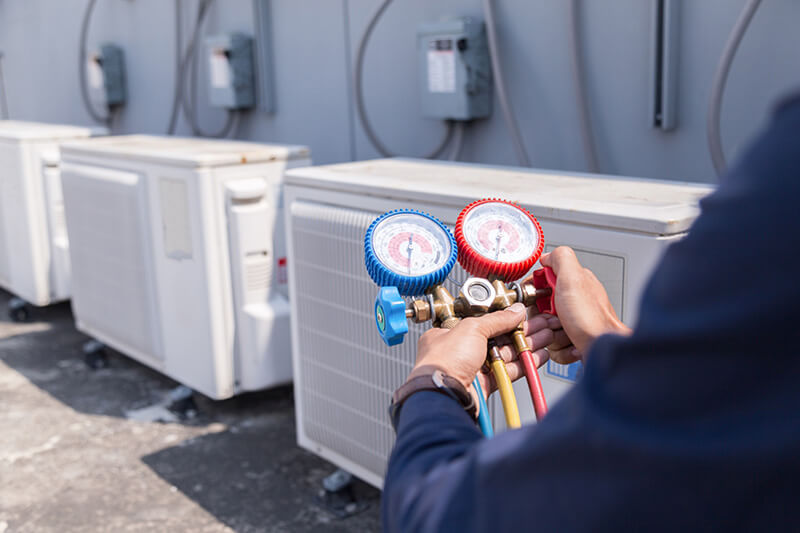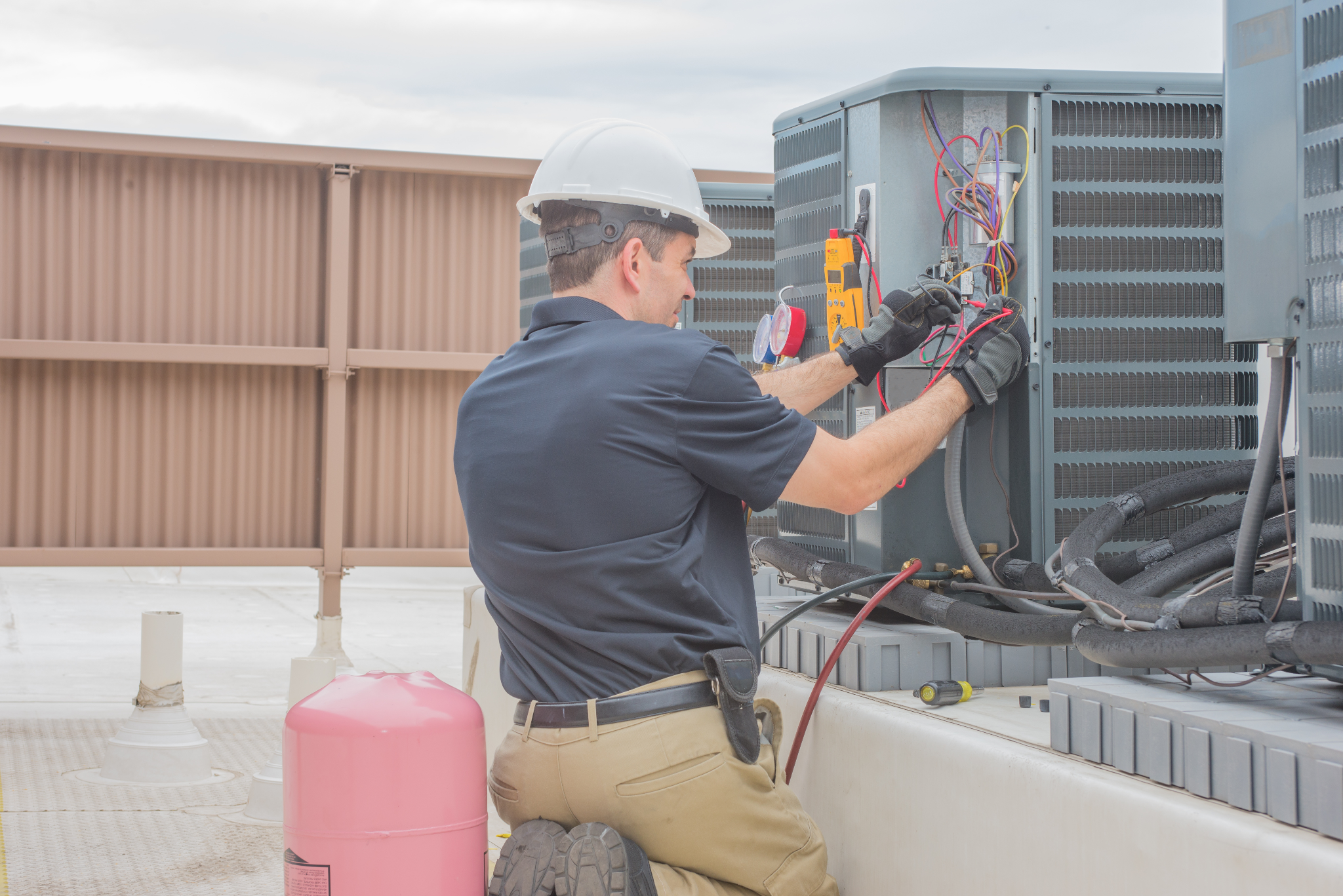Avoid Costly Repairs with Scheduled heat pump service
Avoid Costly Repairs with Scheduled heat pump service
Blog Article
Picking In Between a Heat Pump and Furnace: Key Considerations for Your A/c Needs
When reviewing heating options for a/c needs, the choice between a heatpump and a furnace can be intricate. Each system uses unique benefits tailored to specific environments and energy efficiency objectives. Comprehending these differences is necessary for making an enlightened option. Key factors such as installation prices and environmental impact better make complex the selection procedure. Which choice truly straightens with one's comfort and sustainability preferences? The adhering to sections will explore these factors to consider carefully.
Recognizing Warmth Pumps: Exactly How They Function and Their Benefits
While many home owners think about numerous home heating choices, understanding just how heat pumps feature and their advantages can considerably affect their choice. Heat pumps operate by moving warmth instead than creating it. In the winter season, they draw out heat from the outside air or ground and transfer it inside, while in the summer, they reverse this process, cooling down the home by getting rid of heat outside. This dual performance makes them functional for year-round climate control.One of the main advantages of warm pumps is their power performance. They utilize substantially less electrical power contrasted to standard furnace, potentially leading to lower energy expenses (ductless mini splits). In addition, heatpump have a smaller carbon impact, making them an eco-friendly selection. They also need much less maintenance than conventional systems, adding to lasting expense financial savings. On the whole, recognizing the auto mechanics and benefits of heatpump can aid homeowners make notified decisions concerning their heating and cooling needs
Discovering Furnaces: Types, Procedure, and Benefits
Heating systems are available in different types, including gas, electric, and oil versions, each with distinctive functional systems. Recognizing these differences is vital, as they affect efficiency and home heating efficiency. Furthermore, heating systems provide various advantages, such as regular warm output and integrity in cooler climates.
Kinds of Furnaces
Furnace can vary substantially in style and operation, with furnaces being a preferred selection among homeowners. There are numerous types of heating systems, each making use of various gas sources and technologies. Gas heaters prevail, leveraging gas to generate warm efficiently. Electric furnaces, on the various other hand, utilize electrical resistance to produce heat, usually preferred for their simple installation. Oil heating systems, while much less typical, work in areas with minimal gas accessibility (heat pump service). Additionally, condensing heaters maximize energy effectiveness by capturing and reusing exhaust gases. Each type operates via a system of heat exchangers and ductwork to distribute cozy air throughout a home. Understanding the distinctions between these heater types is necessary for educated a/c decisions
Benefits of Heaters
For property owners seeking trusted warmth during cool months, the benefits of heaters are substantial. Furnaces offer consistent heating, ensuring even temperature levels throughout the home. They are particularly efficient in severe cool, commonly outperforming warmth pumps in cold conditions. Numerous kinds, consisting of gas, electric, and oil heaters, supply flexibility to fulfill varied requirements and preferences.Furnaces likewise tend to have reduced preliminary installment prices compared to heat pumps, making them a more available alternative for several. Their robust layout adds to a longer life expectancy, with lots of systems lasting over 15 years with proper maintenance. Additionally, modern furnaces are commonly outfitted with innovative technology for boosted effectiveness, which can lead to minimized energy bills. Generally, furnaces remain a dependable selection for effective home heating.

Power Efficiency: Contrasting Warmth Pumps and Furnaces
When comparing power performance in between heat pumps and heating systems, the Seasonal Power Efficiency Ratio (SEER) plays a crucial role in identifying performance. Additionally, an operational price analysis reveals the long-lasting monetary effects of each system. Understanding these elements can lead homeowners in making informed decisions regarding their home heating services.
Seasonal Energy Performance Ratio
Power effectiveness plays a crucial role in the decision-making process between heat pumps and heating systems, especially when taking into consideration the Seasonal Power Efficiency Ratio (SEER) This metric measures the cooling effectiveness of heatpump over a whole cooling season, providing a standardized way to assess performance. Higher SEER ratings indicate higher power efficiency, equating to reduced power usage and lowered energy costs. In comparison, heaters are generally evaluated making use of the Yearly Gas Use Effectiveness (AFUE) rating, which reflects home heating effectiveness. When contrasting these two systems, house owners must prioritize SEER rankings for heat pumps, as they directly influence general energy cost savings and environmental sustainability. An extensive understanding of SEER can significantly affect the lasting complete satisfaction and cost-effectiveness of the picked heating and cooling solution.
Functional Cost Analysis
Recognizing the functional costs related to warmth pumps and furnaces is vital for home owners examining their choices. Warmth pumps normally provide greater energy performance, transforming electric power into warmth with very little waste. This causes lower month-to-month utility costs, particularly in moderate environments. Conversely, typical heating systems, particularly gas versions, may have lower ahead of time expenses yet can incur greater operational expenditures in time as a result of fuel rates and efficiency ratings.Moreover, heatpump can operate as both heating and cooling down systems, possibly reducing the need for different cooling and heating devices. While first financial investments for heat pumps might be greater, their long-lasting cost savings in power efficiency can make them a much more economical choice for numerous families. Careful analysis of regional power rates is vital to establish the most effective option.
Setup Expenses: What to Anticipate for each and every Heater
Setup prices for heater can differ substantially between heat pumps and heaters, influencing home owners' choices. Heatpump generally have higher in advance installation prices, typically ranging from $3,500 to $8,000, depending on the unit size and complexity of installation. This consists of the exterior system, interior handling system, and needed ductwork alterations. Alternatively, furnaces often tend to have reduced preliminary costs, averaging in between $2,500 and $6,000, which can be appealing for budget-conscious property owners. However, setup expenditures can enhance if considerable ductwork is required.Moreover, the selection of gas type for heating systems-- natural gas, propane, or electrical-- can additionally influence installment expenses. While heatpump provide energy efficiency, their first financial investment might discourage some purchasers. Eventually, evaluating installment costs alongside lasting savings and performance will certainly assist home owners in making notified decisions about their furnace.
Climate Considerations: Which System Performs Much Better in Your Location
How do climate conditions influence the efficiency of heater? The efficiency of warmth pumps and heaters can vary substantially relying on the neighborhood environment. In moderate climates, heatpump excel by successfully transferring warmth from the outdoors air, making them an energy-saving option. Nonetheless, their efficiency lessens in very cool temperature levels, where they might battle to draw out adequate heat. Conversely, heaters, specifically gas models, supply consistent and trusted warmth despite outdoor conditions, making them more effective in chillier regions.In areas that experience milder winter seasons, heat pumps can operate efficiently year-round, supplying both heating & cooling. In comparison, areas with rough wintertimes usually have a peek here benefit from the effectiveness of heating systems. Inevitably, recognizing the neighborhood environment is important when choosing in between a heatpump and a heater, as it straight impacts their functional performance and general efficiency.
Upkeep Demands: Long-Term Care for Warmth Pumps vs. Furnaces
While both warm pumps and heaters need normal upkeep to assure peak efficiency, their specific needs and treatment routines vary considerably. Heaters normally need much less regular interest, with yearly examinations sufficing to check for gas leakages, tidy filters, and evaluate total performance. Their easier design usually enables uncomplicated repairs.In contrast, heat pumps require semiannual upkeep because of their dual function in heating & cooling. This consists of cleansing coils, inspecting cooling agent levels, and making certain that both the indoor and exterior devices function at their best. Furthermore, heatpump upkeep typically involves more detailed components, making specialist maintenance essential.Neglecting maintenance can result in lessened efficiency and boosted energy prices for both systems. Ultimately, home owners ought to think about these long-lasting treatment demands when picking in between a warm pump and a furnace, as aggressive maintenance can extend the life expectancy and efficiency of either system substantially.
Environmental Effect: Picking a Lasting Heating Choice
The environmental effect of furnace is a critical evaluation for property owners seeking lasting alternatives. Heat pumps are generally much more my company energy-efficient than traditional heating systems, as they transfer warmth instead of create it, greatly decreasing carbon exhausts. By making use of renewable resource resources, such as air-source or geothermal warmth pumps, house owners can better decrease their eco-friendly footprint.On the various other hand, gas heating systems discharge greenhouse gases and add to air pollution, though they typically offer higher heat outcome. Developments in innovation have actually led to the growth of high-efficiency heating systems that reduce emissions.Ultimately, selecting a home heating system includes considering performance against ecological effect. Property owners are encouraged to mirror on regional energy sources and rewards for renewable systems, ensuring a selection that lines up with both individual comfort and environmental responsibility. The decision influences not only immediate comfort but likewise lasting sustainability and ecological health.
Regularly Asked Inquiries
The Length Of Time Do Warm Pumps and Furnaces Generally Last?
The lifespan of warmth pumps generally varies from 15 to two decades, while heating systems can last in between 15 to thirty years. Routine maintenance significantly impacts their long life and performance in supplying heating options.
Can I Make Use Of a Warmth Pump in Very Cold Climates?
Warm pumps can operate in exceptionally cold climates, but their effectiveness diminishes as temperatures decrease. In such problems, extra home heating sources may be essential to maintain comfortable indoor temperature levels and ensure peak efficiency.

What Is the Noise Level of Warmth Pumps Versus Furnaces?
The sound levels of heatpump and furnaces differ significantly. Typically, heatpump operate even more quietly than traditional heaters, making them preferable for those delicate to seem, while furnaces may produce louder functional sounds during heating cycles.
Are Heat Pumps Suitable for Both Cooling And Heating?
Warmth pumps are certainly appropriate for both cooling and heating (heat pump replacement ooltewah tn). They work by transferring heat, supplying efficient temperature level control year-round, making them a functional option for homeowners seeking an all-in-one cooling and heating remedy
What Size Furnace Do I Required for My Home?
Determining the ideal size home heating system for a home calls for assessing aspects such as square footage, insulation high quality, here are the findings regional climate, and the home's design. Consulting a specialist can guarantee a precise assessment and suitable convenience. Warmth pumps normally offer higher energy effectiveness, transforming electric energy right into heat with very little waste. In modest environments, warm pumps excel by efficiently transferring warm from the outside air, making them an energy-saving option. Conversely, furnaces, particularly gas designs, supply reputable and regular warmth no matter of outdoor problems, making them better in colder regions.In locations that experience milder winters, warm pumps can run efficiently year-round, providing both heating and air conditioning. Heat pumps are normally extra energy-efficient than typical heaters, as they move heat instead than create it, significantly lowering carbon exhausts. By using sustainable energy sources, such as geothermal or air-source warmth pumps, home owners can further lessen their environmental footprint.On the other hand, all-natural gas heaters emit greenhouse gases and add to air contamination, though they usually provide greater heat outcome.
Report this page